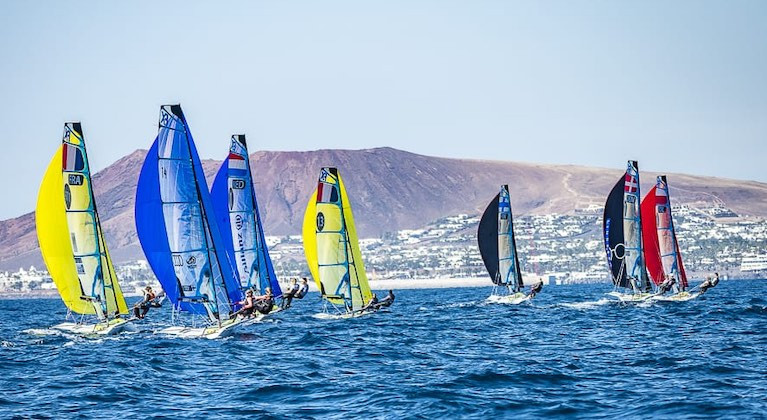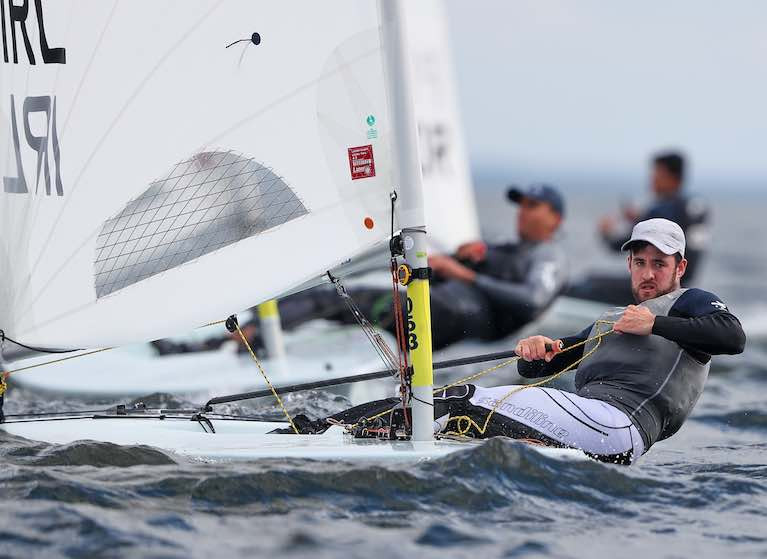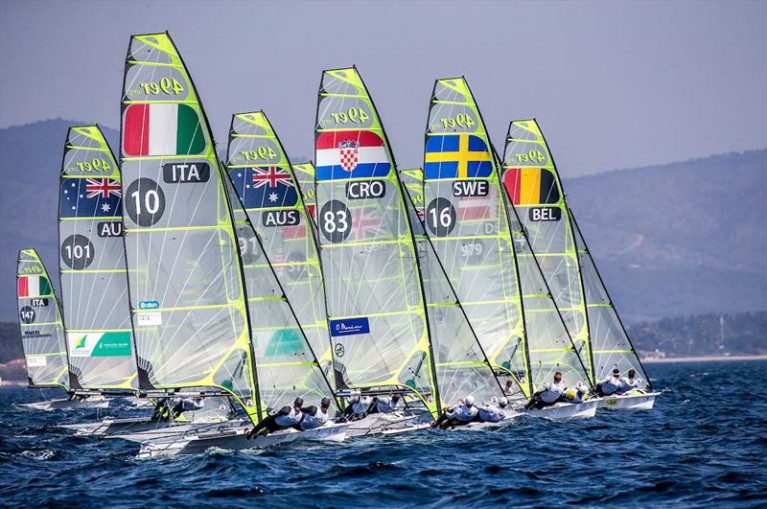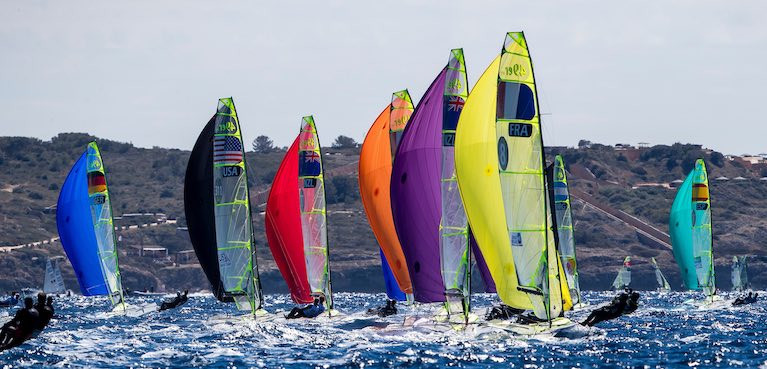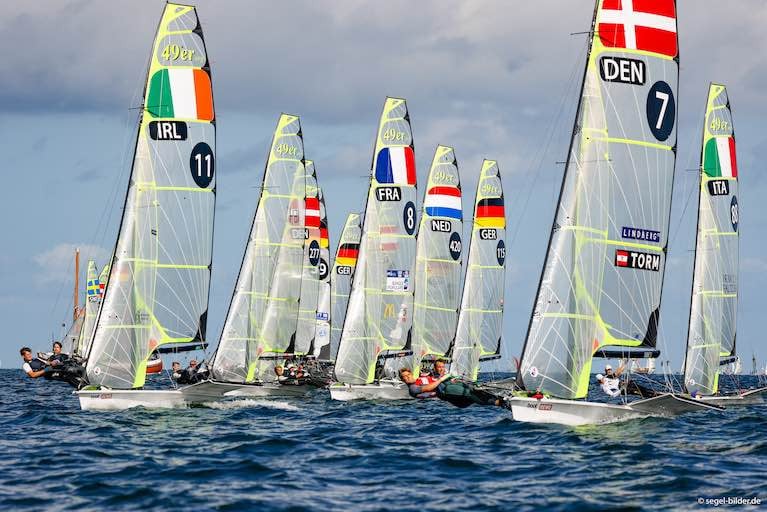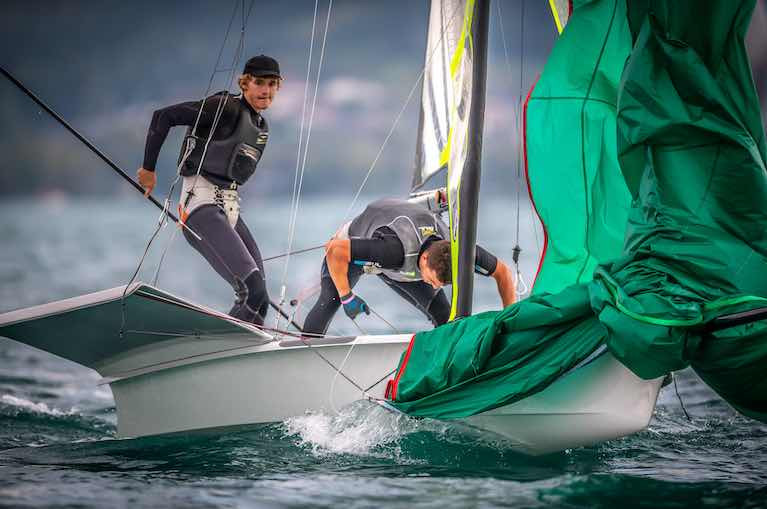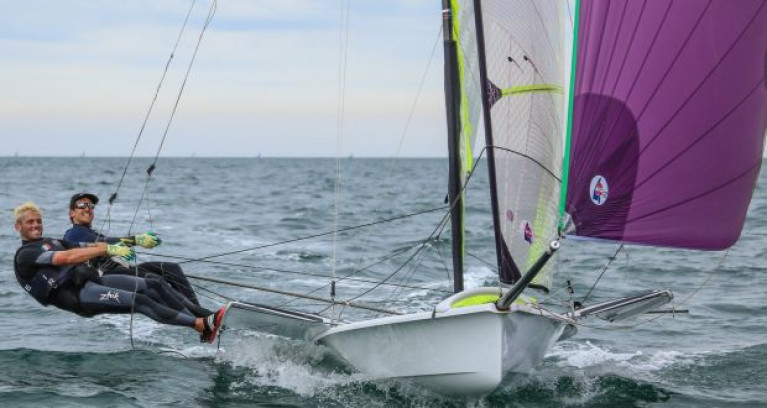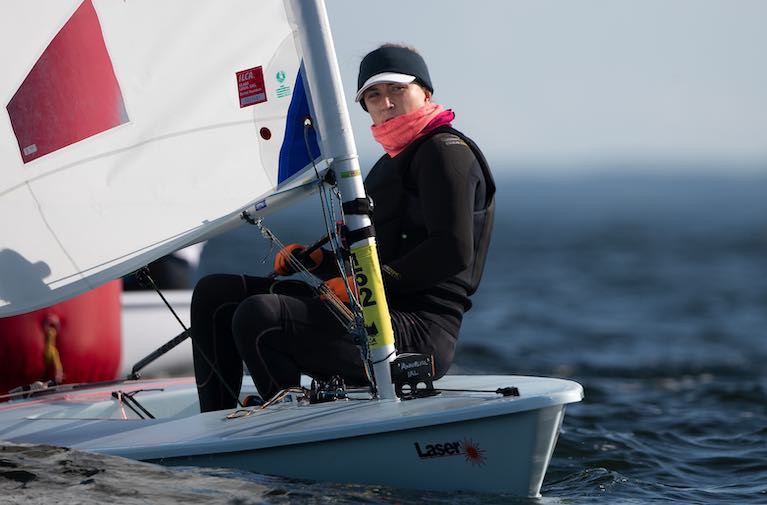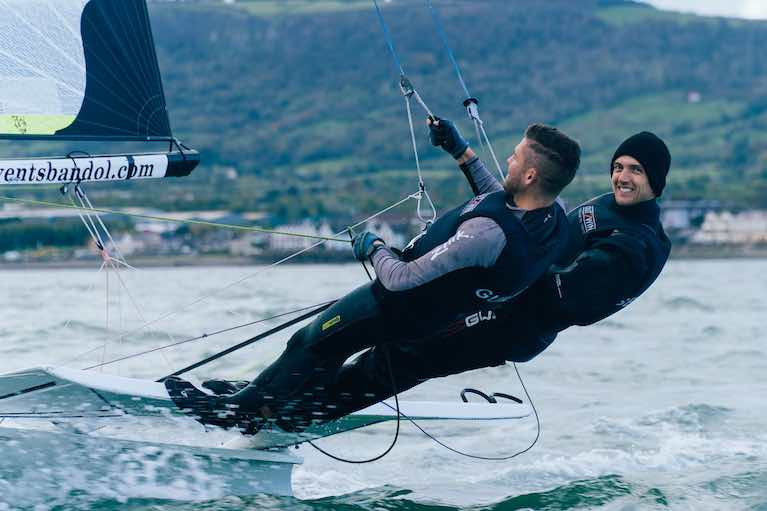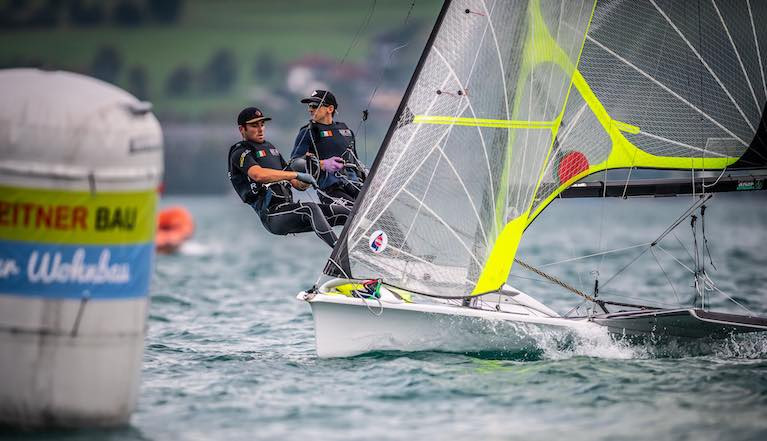Displaying items by tag: 49er
Irish 49ers Head for New European Olympic Qualifier in Lanzarote
Two Irish 49ers will race for the last Tokyo 2020 berths at a hastily put together European Olympic Qualifier event in Lanzarote, Spain this March.
The Princess Sofia Regatta was meant to be the important qualifier, but it was forced to postpone until after the Olympics.
The Lanzarote race days are March 23-28, 2021 giving teams five weeks to arrive and prepare for the regatta, removing some of the uncertainty in Olympic circles caused by COVID-19.
Ireland has to be the top of the unqualified European nations to win the remaining slot. The key contenders are Ireland, Italy, Belgium, Sweden, Estonia and Russia.
As Afloat reported previously, double Olympian Ryan Seaton teamed with Seafra Guilfoyle and Robert Dickson and Sean Waddilove are both chasing the elusive Olympic place.
Lanzarote recently held a winter series in which Irish Laser sailors had some success in strong winds and rolling seas and many teams are already on site.
Teams needing to arrive will need a recent PCR test and a visa.
Since the announcement of the event, organisers are now also dealing with the fact that a ferry from the Canary island back to mainland Spain doesn't leave until six days after the regatta, so the organisers are now attempting to see how feasible it is to secure an extra ferry or move the dates of the Qualfier.
If the new qualifier goes ahead, Irish Sailing will be required to update its published nomination procedure arising out of the postponements of both Genoa 2020 and Palma 2021 regattas to reflect the new 'Final Nation Qualifier'.
As per the IS website today the current published procedure is:
If the nation qualifies at the final nation qualifier in Genoa (13 April 2020) (“Final Nation Qualifier”) the OSG will recommend the Candidate that qualified the nation.
4.6 If the nation receives a place in the Games through a reallocation of places by World Sailing the place will go to the Candidate who had the lowest score combining the Final Nation Qualifier result and their 2019 World Championship result, calculated in accordance with the scoring principles set out in paragraph 6.
The Olympic Games Sailing Qualification system's "what if" scenarios may be called in to play if pandemic related cancellations continue to ravage the high-performance sailing scene.
There are particular implications for the two classes in which Ireland still has reasonable hopes of achieving qualification - the Men's one-person dinghy and the Men's skiff.
Afloat has mulled through the complex paperwork to provide a guide to the qualification system.
Men's one-person dinghy (Laser)
The remaining event for European qualification is the Hyeres regatta in France in April. For Ireland to qualify, an Irish sailor would have to finish in the top two of those European countries that have yet to qualify.
The main contenders for these slots, based on previous form, are Switzerland, Spain, Holland, Ireland, Portugal, Italy, Denmark and Poland.
However, should the qualification regatta not go ahead, and there is some doubt as organisers review the attendance quotas in the light of increased French government restrictions, then it is possible that World Sailing will revert to the reallocation list.
Ireland is currently 4th on that list which is based on results at the 2019 Worlds. As there are only two slots available for Europe, Ireland's chances of qualifying this way are slim.
However, there are also two slots available for Asian countries who have not yet held a continental qualifier. Should this event not take place and if World Sailing opts for using the reallocation list, those places are allocated, regardless of continent, according to the stated pecking order, which could benefit Ireland.
Men's Skiff (49er)
Much the same situation exists here. Although the remaining European qualifier (Palma) is cancelled, the European Championship is scheduled for Greece in May and could be substituted as a qualifier.
In this case, Ireland has to be the top of the unqualified European nations to win the remaining slot. The key contenders are Ireland, Italy, Belgium, Sweden, Estonia and Russia.
In the event that a qualifier can't be sailed, the reallocation list puts Ireland second in line after the USA.
Should World Sailing decide to use this method, then Ireland may have to rely on the Asian and African qualifiers being cancelled also as Ireland's status on the list puts them ahead of the other unqualified nations.
Should any nation that is qualified or has yet to qualify, choose not to take up their slot, then the re-allocation list is used. This is a long shot but is still in play.
Clarification on this process is expected from World Sailing later this week.
49ers Weigh Up Alternative Olympic Qualification as Historical Results Favour Ireland for Tokyo Berth?
World Sailing is reviewing both Hyeres Regatta in France in April and the 49er European Championships Greece in May as alternative Olympic Qualification Regattas following the postponement of March's Trofeo SAR Princesa Sofía yesterday.
As Afloat reported earlier, the Palma event will now be held in October due to COVID but it means it can no longer serve as a qualification event for July's Tokyo Games, itself under question due to the pandemic.
It's a developing scenario that casts doubt as to how the final European Olympic berth will be awarded.
As Afloat previously reported, four nations are in contention for just one skiff place, including Ireland.
And in a further twist to the story, one of the alternative regattas being considered has just suspended entries in the face of increasing lockdown measures.
Over the weekend, Hyeres Regatta is understood to be 'reviewing its quotas' for its April regatta due to French Government restrictions.
The Europeans (May 4-9) are the final major championship of the 2020 Quadrennial and will be held in Thessaloniki, just two months out from the Games.
As a result, some anxious European 49er teams will be keeping a good lookout from any updates from World Sailing this week in order that they can gain entry to events they may not necessarily have had on their campaign schedules.
 North-south combination - Double Olympian Ryan Seaton (right) and Seafra Guilfoyle from Belfast Lough and Cork Harbour
North-south combination - Double Olympian Ryan Seaton (right) and Seafra Guilfoyle from Belfast Lough and Cork Harbour
According to 49er class insiders, World Sailing has promised to update sailors on the matter later this week.
Likewise, the aim is also to publish the new Asian and African Qualifier by the end of the week.
Historical results to favour Ireland?
Two Irish pairings for the Tokyo berth are up against Sweden, Italy and Belgium.
Double Olympian Ryan Seaton teamed with Seafra Guilfoyle and Robert Dickson and Sean Waddilove both chasing the elusive Olympic place.
If an alternative regatta can't be found and the matter can't be settled on the water, World Sailing said previously it would rely on historical results to decide the Olympic ticket as Afloat reported here.
 Debut Olympic campaign - U23 49er World Champions Robert Dickson and Sean Waddilove from Howth and Skerries
Debut Olympic campaign - U23 49er World Champions Robert Dickson and Sean Waddilove from Howth and Skerries
Speculation on this point has now increased as the third wave of the pandemic in Europe is not going away any time soon.
Historial results may be good news for Ireland in this class. Form at the 2019 Worlds suggests that Irish sailors would be favourites for the Olympic place having finished ahead of the other three candidates but it is likely to be a complex scenario that awaits confirmation from World Sailing. Afloat has mulled through the paperwork to provide a guide to the qualification system here.
If it does comes to pass – and we are still some way off such a scenario – it will then be a matter of deciding which Irish 49er team is nominated. As regular Afloat readers will know, that's a process that has already caused consternation in Irish Olympic sailing circles this quadrennial.
49ers Must Look Elsewhere for Tokyo Qualification Regatta as Trofeo SAR Princesa Sofía is Postponed Until October
The Trofeo SAR Princesa Sofía, a reference event among international sailing regattas, has postponed its 51st edition to October.
The March regatta due to take place in 50 days time was the final qualification event for the last European berth in the 49er class for Tokyo 2020, in which Ireland is vying for a place.
The Olympic classes and offshore regatta will be held from 2nd to 9th October in the bay of Palma but this will be of no value to the 49ers who will, as Afloat reported earlier, now look for a 'Plan B' from World Sailing.
The hope is that racing will decide the final Olympic berths in the 49er class in which Ireland is one of four countries hoping to progress to Tokyo but uncertainty surrounds what lies ahead.
The Organising Committee has made this decision following the recommendations from the Balearic Islands Government and after the joint assessment of the evolution of the global pandemic caused by Covid-19.
Ferran Muniesa, the Trofeo Princesa Sofía Race Manager, outlines, “The priority is the safety of the approximately 1000 sailors from around 50 nations that participate each year in this regatta, which must take place in the best possible conditions both ashore and at sea”.
The Princesa Sofía, organised by Club Nàutic S’Arenal, Club Marítimo San Antonio de la Playa, Real Club Náutico de Palma and the Balearic and Spanish Sailing Federations, will continue to have the support of its collaborators Iberostar, Marine Pool, Trasmediterránea and Europcar, as well as of the main Balearic public institutions.
The new Notice of Race is already available on the regatta’s official website (www.trofeoprincesasofia.org). The organisation has made the announcement to the around 300 sailors that had already made their application to participate in the edition to be held from 26th March to 3rd April.
The Mallorca Sailing Center Regatta, the training regatta prior to the Trofeo Princesa Sofía, will be held from 24th to 26th September 2021.
As Irish 49ers Eye Last Chance for Tokyo, 2021 49er Europeans are Confirmed for Greece
As Ireland's two 49er campaigns prepare for their last chance to win an Olympic berth in Tokyo, details of the final major championship of the 2020 Quadrennial have been announced in Greece.
After four years of campaigning, minds have been focussed in the Irish camp with the news that the 49er’s Tokyo Olympic qualifier has been confirmed as the Princesa Sofia regatta in Palma, Spain – 26 March – 3 April 2021.
As Afloat previously reported, there are four nations in contention for just one skiff place, including Ireland.
Two Irish boats are up against Sweden, Italy and Belgium. Ryan Seaton and Seafra Guilfoyle and Robert Dickson and Sean Waddilove both chasing the elusive Olympic place.
The teams are currently training at the Irish winter base in Villamoura, Portugal with the Princesa Sofia crunch regatta just 70 days away.
If either of the Irish boats is successful in Palma, there is no doubt they will be heading to Thessaloniki, Greece from May 4-9, 2021 for the 49er, European Championships. Just two months ahead of the Tokyo Olympics, it is expected to be the final chance for Olympians to get into racing form and for the next generation of aspiring Olympians to catch the favourites before they head onto the World Stage.
The regatta will be hosted by the Nautical Club of Thessaloniki is the oldest Nautical club in all of Greece, a country rich a rich history at sea. The club has sent members to the Olympics as long ago as 1948 and more recently has been a centre of 470 and Tornado sailing in Greece. In hosting the 49er, 49erFX, and Nacra 17 European Championship, NCTH will continue this Olympic spirit in the modern double-handed classes.
It is expected that most Olympic contenders will attend, while the Organising Authority understands the need to be careful in bringing people together and of the many travel restrictions in place globally. Onshore activities will be limited and done electronically for the most part, while on water racing activities will simulate the regular racing environment as much as possible.
Path to Paris 2024 Regatta
2021 initiates the Path to Paris, and many new and younger teams are expected to join the racing aiming toward the 2024 Olympics. Four years out from the Olympics is typically when many sailing campaigns get started, and 2021 should be no different.
Four Nations (Including Ireland) Will Seek Final 49er Olympic Berth in Palma Next March
Minds have been focussed with the news that the 49er’s Tokyo Olympic qualifier has been confirmed as the Princesa Sofia regatta in Palma, Spain – 26 March – 3 April 2021.
There are four nations in contention for just one skiff place, including Ireland.
Since late summer performance sailing has been back in regatta mode with the two 49er teams competing across Europe in Poland and Italy.
As Afloat previously reported, two Irish boats are up against Sweden, Italy and Belgium. Ryan Seaton and Seafra Guilfoyle and Robert Dickson and Sean Waddilove both chasing the elusive Olympic place.
After training in Denmark, the 49ers headed to Germany with some good racing at Kiel Week.
Robert Dickson and Sean Waddilove finished in 14th place, and Ryan Seaton and Séafra Guilfoyle finished in 27th.
The European Championships then took place in Lake Attersee in Austria with Dickson and Waddilove finishing in 18th - a personal best performance and a strong indication of their rising talent.
The 49ers are currently training in Villamoura, Portugal ahead of March's date with destiny.
Royal Cork 49er Crew Seafra Guilfoyle Becomes a ‘Dare to Believe’ Athlete Ambassador
The Olympic Federation of Ireland has announced that 49er skiff crew Seafra Guilfoyle has become one of its ‘Dare to Believe' ambassadors.
The Royal Cork Yacht Club sailor was included in the unveiling of 25 ‘Dare to Believe’ athlete ambassadors from across a variety of sports.
Guilfoyle teamed with Double Olympian Ryan Seaton of Belfast Lough is currently seeking the final country berth for Ireland in the 49er skiff class in order to get to Tokyo next year.
The OFI also announced FBD Insurance as the sponsor of this year’s ‘Dare to Believe’ Olympic Schools Programme. Ireland’s homegrown insurer is the Official Sponsor of Team Ireland on the road to Tokyo, and this extension of the sponsorship will allow ‘Dare to Believe’ to continue to grow and inspire schoolchildren nationwide. Today’s announcement
In its first year, ‘Dare to Believe’, which was set up with funding from Olympic Solidarity support, surpassed all of its targets, bringing the Olympics into the classroom for over 5,000 children nationwide. The school activation programme, championed and supported by the Olympic Federation of Ireland Athletes’ Commission, was developed by 2008 Olympian Roisin McGettigan and, as the programme moves into the next phase, the focus is on further expansion, with a boost of 16 new ambassadors to the programme, bringing the total to 25 athletes.
‘Dare to Believe’, will teach primary school students about Olympic Values and Olympism through a curriculum that includes over 40 of the approved education methodologies. The ‘five-ring’ programme allows teachers to interactively explore broad themes that reflect the Olympic Values of Respect and Equality, Healthy Body and Mind, and Joy of Effort. The final ring focuses on Striving for Excellence, which sees the athlete ambassador deliver their personal sporting story to the class, with the changing environment meaning that these visits will now be virtual.
A host of the ‘Dare to Believe’ athletes, including boxer Kellie Harrington, hockey stars, Anna O’Flanagan, Roisin Upton and Emma Buckley as well as Oliver Dingley (Diving), Sive Brassil (Modern Pentathlon) and Brendan Boyce (Race Walking) will also appear on RTÉ’s After School Hub programme next week from Monday, November 23rd, with Olympic Federation of Ireland Athletes’ Commission member and Olympic medallist in boxing, Kenneth Egan, also set to feature on the programme.
Olympic Federation Updates on Irish Sailors Looking to Qualify in 49er & Laser for Tokyo 2021
The Olympic Federation of Ireland (OFI) say in an update that Irish athletes across most sports are still on the qualification journey for the Tokyo Olympic Games which now take place next year from 23 July to 8 August 2021. Sailing is no different with only one of a possible three confirmed so far.
To date, there are 52 confirmed athlete spots for Tokyo, with many more athletes and teams sitting inside qualification status.
Eleven sports to date will enjoy Irish representation in Tokyo, and the current tracking of the team could see Team Ireland travelling next summer to Tokyo with the largest Olympic team to date.
In sailing, Ireland has already qualified one boat for Tokyo – the Women’s Laser Radial, which was achieved via Aisling Keller at the World Championships in 2019 – this position is set to be filled by Annalise Murphy, who has been nominated by Irish Sailing after a cut-short trial that left both Keller and Howth rival Aoife Hopkins 'devastated'.
'Selection', say the OFI, will be made once the process has been completed.
 Seafra Guilfoyle (left) and Ryan Seaton are one of two Irish 49er campaigns looking for the last nation berth for Tokyo 2021
Seafra Guilfoyle (left) and Ryan Seaton are one of two Irish 49er campaigns looking for the last nation berth for Tokyo 2021
There are still limited opportunities for Ireland to qualify another boat – the 49er can still qualify at the planned European Sailing Cup where one spot is available. As Afloat reported earlier, Ireland is vying with Belgium, Sweden and Italy for the one remaining European place. Form at the 2020 Worlds suggested that Irish sailors would be favourites having finished ahead of the other three candidates.
 Laser sailor Finn Lynch, one of three Irish helmsmen seeking a final nation berth for Tokyo 2021
Laser sailor Finn Lynch, one of three Irish helmsmen seeking a final nation berth for Tokyo 2021
In the Men’s Laser, there are two spots available at the planned European Sailing Cup. Up to six countries are in the running – Slovenia, Switzerland, Spain, Netherlands and Belgium and Ireland with Ireland finishing behind all of these at the latest World Championships.
In both of these events, the majority of spots were available at the World Championships in 2019 but unfortunately, Ireland missed out.
As Afloat reported in back in March the IOC, in their determination to maintain normality – or to return to normality as soon as possible – have issued a position update on the 2020 Tokyo Olympics and the potential changes to the qualification process disrupted by the spread of Covid-19.
Many sports, including sailing, have had to cancel qualifying events and the IOC has asked International Federations to consider revising the qualification process which may include ranking or historical results. More on this here.
Northern Ireland Olympian Ryan Seaton Says New Slipway at Carrickfergus Sailing Club is a 'Game-Changer'
Olympic sailor Ryan Seaton is back training at his home club in Carrickfergus on Belfast Lough following the completion of a slipway widening project.
In past campaigns Ryan has had to train away from home because the slipway at Carrickfergus was unsuitable for launching a high-performance dinghy.
Part-funded by Mid and East Antrim Borough Council, the new slipway means Ryan, who represented Ireland in the 49er Class at the London 2012 and Rio 2016 Olympic Games, can now launch safely and undertake his winter training on familiar waters for the first time as he bids for a place at next year's games in Tokyo.
With qualification for the much-anticipated competition just around the corner, Ryan and his crew, Seafra Guilfoyle from Royal Cork YC and University College Cork Sailing Club, are busy training and making plenty of use of the new slipway as Seaton aims for this third Olympics in a row. The duo competed in Austria at Lake Attersee last month to battle it out at the Europeans, as Afloat reported here.
 The newly widened slipway at Carrickfergus Sailing Club
The newly widened slipway at Carrickfergus Sailing Club
Ryan said "Carrickfergus and Belfast Lough is one of the best sailing locations throughout the UK and Ireland but I was unable to take full advantage of training on it due to the lack of a slipway suitable for my dinghy. This new facility is an absolute game-changer for me and will make a huge difference as I can now continue my professional sailing career at my home club and complete some vital training ahead of Tokyo 2021 qualification".
He continued "My thanks are extended to Carrickfergus Sailing Club and Mid and East Antrim Borough Council for making this possible and improving my training opportunities."
Mayor of Mid and East Antrim, Councillor Peter Johnston said the initiative will be a boost to the entire sailing community. "As a Council, we are proud to be able to assist with this very worthwhile project and wish Ryan every success as he aims for next year's Olympic games. This new feature is a boost to both the Club and other users and will hopefully inspire others to get involved and may even produce a few future Olympians."
Northern Ireland Olympic Sailor Ryan Seaton Preparing for Busy Training Season Ahead
Northern Ireland sailor Ryan Seaton from Ballyholme Yacht Club on Belfast Lough, took to the water at Lake Attersee, Austria, earlier this month to battle it out at the Europeans with the other half of his 49er duo Seafra Guilfoyle from Royal Cork Yacht Club.
They finished 26th in the 55-boat fleet in the event which took place from 28 September to 4 October - no mean feat after a difficult few months.
The pair have been able to get only 30 days' sailing in the last six months due to Covid-19 restrictions. Setting out for their journey to compete in Austria, they also had to borrow kit as theirs is still on its way home from Palma after competing there earlier in the year.
Seaton explains that the Europeans were very different to the usual event: "With it being COVID19 times, it made big changes to the racing; we didn't have any measurement or social gathering at all. Masks on and no hugging, though it was great to see all the other sailors from the big Olympic family."
Commenting on their result, Seaton says: "We were happy with how well we sailed under all the circumstances and to be racing in the gold fleet with others who have sailed more and who were using their Olympic kit. To say conditions were shifty is an understatement. We had 60-degree wind shifts and many times we couldn't cross the start line on starboard tack. The event organisers did a great job under the circumstances. Seafra and I kept really positive. We used this event as an opportunity to get more hours on the water, in preparation for next year's Olympic qualification in Palma."
While it is difficult to plan in the current Covid-19 climate, the pair are looking ahead to 2021 and preparations are underway.
They plan to sail in Ireland until the beginning of December and then travel to Villamoura in Portugal to race in better conditions alongside international teams and log quality hours. They will then move down to Palma until April to take part in camps and sail at a small club regatta, working towards the Palma Regatta, an Olympic Qualification event at the end of March.
Seaton comments: "We are super motivated now to get lots of hours on the water. We aim to get 20 days a month completed and we are in the process of getting our kit all back home and sorted in preparation for next year."
RYA Northern Ireland's Performance Manager Andrew Baker says Seaton is on course to a solid year of racing ahead.
"This was Ryan's first real event of the season and was a fantastic opportunity to compete in a world-class field. He has now got a feel for the fleet and his strengths and weaknesses within it. RYA Northern Ireland is pleased that Ryan can now enter the Winter training phase with a clear pathway and goals to achieve."


























